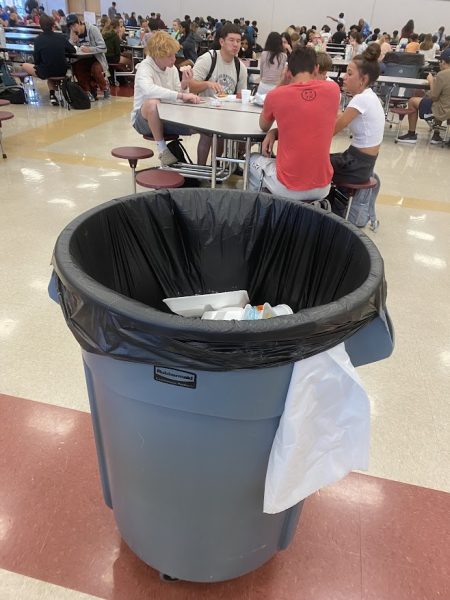On July 22, 2024 the climate clock ticked below five years for the first time in history. This means we officially have less than five years to take action before it becomes irreversible.
According to the U.S Environmental Protection Agency, the temperature of Earth “has risen by an average of 0.11° Fahrenheit per decade.” Although this number may appear micro, it’s significant enough for an average person to notice. We only have a short period of time “to take action” before climate change reshapes our lives in a far more devastating way.
In the cafeteria, countless plastic utensils, containers and most importantly, styrofoam trays are thoughtlessly tossed into a trash bin that’s not reserved for recycling. If recycling trash bins are offered in a class setting, why are recycling trash bins not offered in the cafeteria when hundreds or even thousands pieces of plastic waste are discarded daily?
While climate change appears to be a distant global issue, we are contributing to the environmental crisis simply by not recycling plastic utensils. According to Colgate University, even though plastic trays exit our minds the second it hits the non-recycling trash can, it takes “500 years” to decompose as its “non-biodegradable and non-recyclable.”
The overuse of plastic in our cafeteria is common, from the half eaten sandwich in a plastic container to the use of styrofoam trays. Although styrofoam and plastic is price efficient, it is not eco-friendly.

Climate change affects us daily; according to the Environmental Protection Agency, it affects the “food” that we consume, “the air we breathe” and “the water we drink.” Furthermore, it was revealed that it will cause disease outbreaks “by 2050” if left uncared for.
We could significantly help delay the drastic progression of climate change by extending the amount of recycling bins we see at the school, especially in the cafeteria.
Along with that, switching styrofoam trays to biodegradable cardboard trays or reusable trays are efficient in the long run. However, the school needs to consider the expense of making changes to trays that are used by thousands of students since it will add up.
According to Sharpschool, biodegradable cardboard trays are “more expensive” than styrofoam trays by “approximately three to four times.”
Due to the consideration of cost efficiency, switching trays may be a strain on our budget. Instead, we can make small changes such as introducing recycling bins to the cafeteria to contribute to a big difference. It’s about time we show our respect towards our home, Earth, by recycling in the cafeteria before it’s too late.
*Editor’s note: Stephanie Kim and Nardose Solomon are student writers. All views expressed in the commentary are their own and are independent of the district, Rouse High School and the publication.


![Mountains of Plastic: There is not a single recycling bin in the Rouse cafeteria, however plastic utensils are offered everywhere. The plastic wrapping can be recycled as well. “There should be recycling bins,” sophomore Baile Higginbotham said. “I think we use a lot of plastic [and] that can be bad for our climate.”](https://rhsrumbler.com/wp-content/uploads/2024/09/Website-Bios-Sep-12-2024-at-12_24-PM1.jpg)